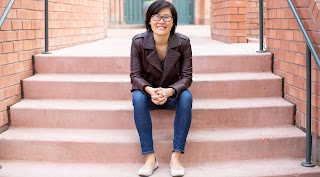Reward Yourself
At a recent Writers' Day at Bay Path, one of the speakers - visiting writer and Curry College English professor Alan Hunter - talked about ways to cultivate and access the creative unconscious. By "creative unconscious," he meant the part of the mind that gives us dreams, images, impulses, and ideas that cannot be accessed by intellectual command. Writers use a lot of different terms to describe it, but they all mean the same thing: that mysterious part of the mind we reach for when sitting down before a blank screen. Alice Munro, the great Canadian short-story writer, called it "wooing the distant parts of myself," as good a description as I've heard.
So how do you do it? How do you "woo" those distant parts when there is so much right in front of you that competes for your attention? It can feel like trying to make out a low murmur from another room while Scottish bagpipers are marching by, someone's ten-year-old is having a drum lesson behind you, and the Vienna Boys Choir is giving its annual Christmas concert in your kitchen. The noise of our lives can make hearing that still, small voice harder than finding a lost ring in a river. After a while, it's easier to just go make a cheese sandwich and check Facebook.
But if you do that, promising yourself you'll start writing later, right after you finish this one little thing, that screen (or piece of paper, or bark, whatever you use) will stay blank the rest of the day.
Alan had a nice idea for circumventing the endless temptation to do anything other than write, and it couldn't be simpler, which is probably why it works. Reward yourself at the end of your writing session. That's it. Do something nice for yourself - eat one small piece of very good chocolate, take a walk, make a cup of tea, listen to a few minutes of your favorite music (for me, a toss-up between Erik Satie or Stevie Wonder). But here's the key: you have to give yourself this reward immediately after writing. Not at the end of the day, not on the weekend. You can't say to yourself, "If you write for ten minutes every morning, I'll take you to the movies on Saturday." It won't work. The creative unconscious in writers, in anybody, responds like a small child to gratification. Meaning: right now.
It doesn't matter if you write for five hours or five minutes. If you write at all, give yourself that small reward. And do it every time. You're building an association between your writing practice and the experience of pleasure. For those among us who inherited a Puritan work ethic (some other time, I'll talk about my father, whose solution to everything was a good swift kick in the pants), the pleasure part is key. Don't kick yourself to write. Don't admonish yourself. Practice what Thich Nhat Hanh calls "loving-kindness," and give yourself that little reward when you're finished writing - even if you only manage to fill a page. A page a day is 352 pages by the end of the year.
So how do you do it? How do you "woo" those distant parts when there is so much right in front of you that competes for your attention? It can feel like trying to make out a low murmur from another room while Scottish bagpipers are marching by, someone's ten-year-old is having a drum lesson behind you, and the Vienna Boys Choir is giving its annual Christmas concert in your kitchen. The noise of our lives can make hearing that still, small voice harder than finding a lost ring in a river. After a while, it's easier to just go make a cheese sandwich and check Facebook.
But if you do that, promising yourself you'll start writing later, right after you finish this one little thing, that screen (or piece of paper, or bark, whatever you use) will stay blank the rest of the day.
Alan had a nice idea for circumventing the endless temptation to do anything other than write, and it couldn't be simpler, which is probably why it works. Reward yourself at the end of your writing session. That's it. Do something nice for yourself - eat one small piece of very good chocolate, take a walk, make a cup of tea, listen to a few minutes of your favorite music (for me, a toss-up between Erik Satie or Stevie Wonder). But here's the key: you have to give yourself this reward immediately after writing. Not at the end of the day, not on the weekend. You can't say to yourself, "If you write for ten minutes every morning, I'll take you to the movies on Saturday." It won't work. The creative unconscious in writers, in anybody, responds like a small child to gratification. Meaning: right now.
It doesn't matter if you write for five hours or five minutes. If you write at all, give yourself that small reward. And do it every time. You're building an association between your writing practice and the experience of pleasure. For those among us who inherited a Puritan work ethic (some other time, I'll talk about my father, whose solution to everything was a good swift kick in the pants), the pleasure part is key. Don't kick yourself to write. Don't admonish yourself. Practice what Thich Nhat Hanh calls "loving-kindness," and give yourself that little reward when you're finished writing - even if you only manage to fill a page. A page a day is 352 pages by the end of the year.


Comments
Post a Comment